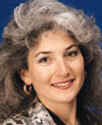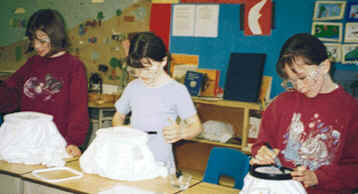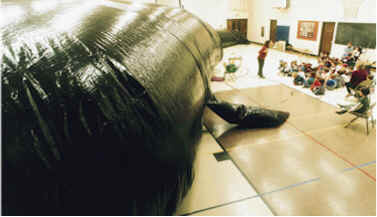 |
Bonnie
Schmidt began her science outreach activities
while pursuing her doctoral degree in
physiology at the University of Western
Ontario. After graduating in 1993, she
formally launched Let’s Talk Science. In
1995, the organization was recognized with an
Honourable Mention at the Peter F. Drucker
Awards for NonProfit Innovation and a Michael
Smith Award for Science Promotion presented
by Industry Canada. |
By Bonnie Schmidt
Our children will be facing a
world that is significantly different than the one in
which we grew up. We don’t even know the names
of the jobs or the nature of the work that will be
created in the next 10 years.
How do we
prepare our young people to thrive in this unknown
environment? It’s not an easy question to
answer, nor is it clear there is a single answer or a
single direction in which to move.
Nevertheless we
all realize that we must continue to do the best job
possible to ensure a bright future for our next
generation. This challenge places teachers at the
forefront as a critical force in shaping the future
of Canada.
But, in a world
that is changing so rapidly, teachers cannot be
expected to be the only source of expertise for their
students, particularly in math, science and
technology. International tests rank Canada in the
middle of the pack and Ontario trailing the pack when
it comes to the performance of our students in
science and mathematics.
How can we do
better? As the new year begins in the classroom,
consider the resources in your community that are
available to enhance your science program. The
parents of your students, science centres and museums
and scientists in local universities, colleges and
industry can all play a role in ensuring the best
education for our youth. Then there’s Let’s Talk Science – an organization
that can help you bring science, technology and
mathematics alive in your classroom.
Let’s Talk Science is a nonprofit
organization working to create a society that
embraces science in everyday life and values the
development of skills required to thrive in a global
economy.
We offer
innovative science programs that engage people and
encourage them to understand the importance of
science in our world. We believe that educators
– in particular elementary school teachers
– play a pivotal role in the development of a
science culture in Canada.
Our programs
aim to increase teachers’ confidence and ability
to teach science more effectively. Our focus on
elementary school teachers ensures we are
contributing to the development of a generation of
young people who must be better prepared to meet a
future where science and technology are an integral
part of life.

Let’s Talk Science
gives students hands-on science experience
with readily-available materials.
We believe that
everyone learns best by doing and by having fun doing
it. Therefore, all Let’s Talk Science programs
include an extensive hands-on component. Through the
national office at the University of Western Ontario,
regional offices in Vancouver and Edmonton and
volunteer-run partner sites at 11 Canadian
universities, Let’s Talk Science offers a
variety of fun and effective programs for teachers
and youth. Thanks to the generous support of sponsors
including DuPont Canada, The Esso Kids Program, and
Industry Canada, these programs are available at low,
or no cost to teachers.
The
award-winning Partnership Program is available at no
charge to elementary and high school teachers who are
interested in developing an extended science
partnership with a university graduate student
volunteer.
Although each
partnership is unique, volunteers usually visit
classrooms, bring students to their university campus
for hands-on science activities, help teachers update
classroom material, act as mentors for student
projects, judge science fairs, correspond with
students through the Internet and provide career
information. This program is available at six Ontario
universities.
Science Delivered professional
development workshops for elementary school teachers
are available in your community on PD days, after
school or on weekends. Sponsored by The Richard Ivey
Foundation, these hands-on workshops have been
developed and tested by a creative team of
scientists, teachers and adult educators who excel at
designing relevant, innovative and fun hands-on
scientific activities that use everyday materials.
Blue-box and other household materials are used so
there is minimal cost to implementing the activities
in you classroom. Workshops include Good Vibrations
– music connections – Batteries Not
Included – a look at energy – Wet ’n
Wild – a study on wetlands in a dry classroom
– and more. Designed to bring more open-ended,
student-directed science to the classroom, these
workshops also meet outcomes listed in the Common
Curriculum and the Pan-Canadian Protocol for Science
Curriculum.
Every spring,
the Science Now!! conference brings a
full day of hands-on science to hundreds of
elementary teachers, sponsored by 3M Canada. Sessions
facilitated by elementary and secondary school
teachers, consultants, scientists and community
leaders demonstrate that science in the classroom can
be exciting, challenging and relevant.
Our newest
program, Focus on Youth, offers in-school science
programming delivered by Let’s
Talk Science staff and associates. Have a
whale of a learning experience with The Blue Whale. This life-sized (30 metres)
model, designed by the Canadian Wildlife Federation,
enables children to sit in the belly of a whale and
provides a unique introduction to the world’s
largest mammal.

Students at Our Lady of
Fatima School in Chatham enjoy talking
science with The Blue Whale.
Six sessions
(360 children), tailored to each elementary grade,
are available in a whole-day presentation. For single
elementary classes a number of hands-on workshops are
available including aviation, chromatography,
inventing, magnets, mystery festival, super science
challenges and more. Many of these workshops include
a take-home component so that children are better
able to involve their parents.
Finally, please
check out the Let’s Talk Science Meeting Place
on the web (http://www.uwo.ca/letstalkscience). This site allows
teachers to communicate with other teachers and
scientists. Sharing your successful science
strategies, posting your questions and responding to
other questions will not only enhance the science
culture in Canada, but around the world!
Let’s Talk Science can help teachers
spread the message that science is fun and surrounds
us daily. Preparing your students to thrive in a
world of science and technology may be easier than
you think.
For more
information on any of our programs, or to find the Let’s Talk Science site nearest you,
please contact the national office at (519) 661-4029
or fax us at (519) 661-3490. Visit the web site at http://www.uwo.ca/letstalkscience or e-mail bschmidt@julian.uwo.ca